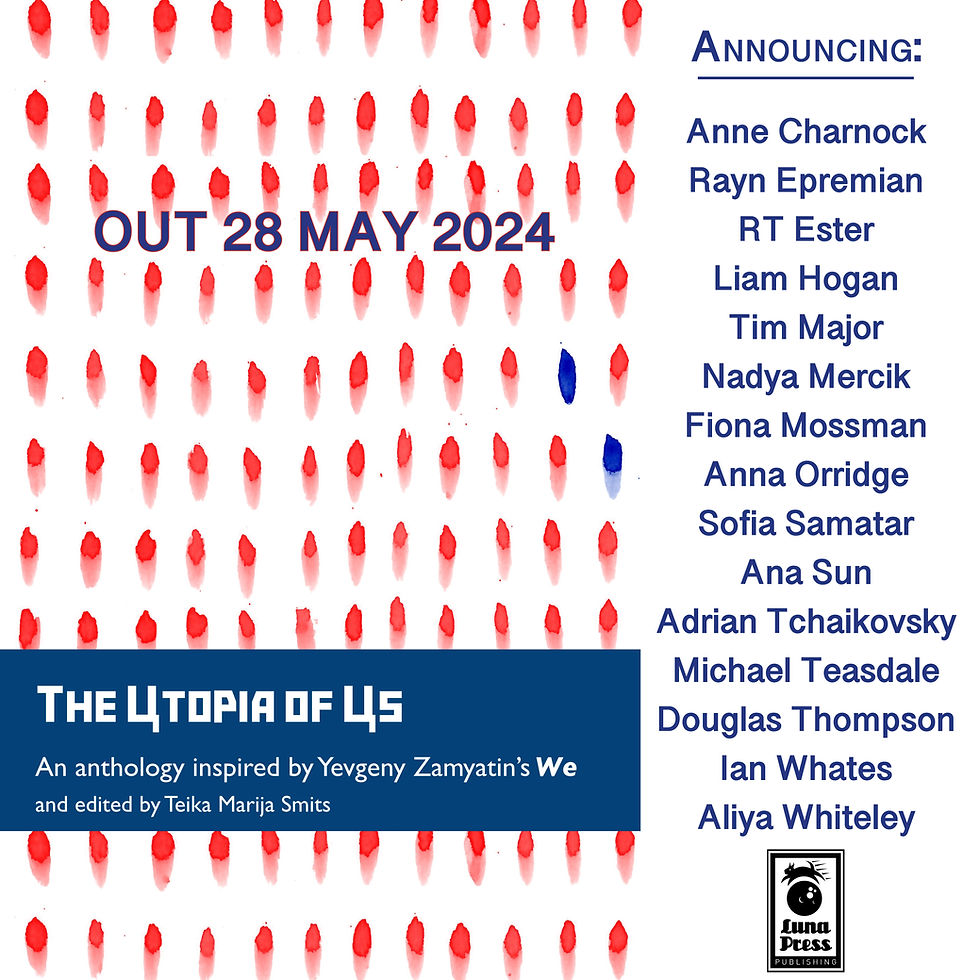
The Utopia of Us anthology is now available for pre-order! Editor Teika Marija Smits has brought together 15 incredible writers and their stories, directly inspired by We by Yevgeny Zamyatin.
It is a charity anthology, and given Russia's current war with Ukraine, royalties from the book will be donated to the Ukraine Humanitarian Appeal.
If you pre-order directly from the Luna website, you will also receive a discount. Check it out!
Today we'd like to introduce you to Ana Sun and the story "Anatomy of Emotion – The Carving of Chance – Seize the Moon".
About the author:
ANA SUN writes speculative fiction from the edge of an ancient town in the south-east of England. She spent her childhood in Malaysian Borneo and grew up living on islands. One of her earliest Solarpunk stories earned her a Utopia Award nomination. In another life, she might have been a musician, an anthropologist – or a botanist obsessed with edible flowers. Her featured stories can be found at https://singingtotigers.com/.
Ana on the story:
While our home is not big enough to house all the books we love, over the years we’ve built up a sizeable anti-library. In fact, I tend to gift away books I’d already read. So I can’t recall how long our copy of We had sat nestled among our shelves; it had been a leaving gift from a former colleague to my partner, who dutifully read it upon receipt, something I didn’t do. The book had moved house with us at least once, migrated along the shelves several times, that when I finally went looking for it, the search took me a good half day.
I suspect I’d put off reading We because a part of me feared its legendary influence; I’d known that it inspired books like Aldous Huxley’s Brave New World and George Orwell’s 1984. As someone who believes that we need more positive narratives to help us come to terms with climate change – and more stories to show us possible, liveable futures – We felt very far away from the route I’d taken in my own writing. So, I’d avoided it, put off reading it.
Eventually, it accompanied me to Bristol on a work-related trip. I read it on the train journey, resumed reading the moment my workshop formalities were over, skipped evening social invitations while I devoured it at the hotel bar alongside a glass of wine, inhaled it most of the way through the night – unable to put it down.
If you stripped away the austere, dystopian science-fiction world, We seemed to me as essentially a romance – a Romeo-and-Juliet of forbidden love. There are so many avenues one could explore in such a rich world, with its autocratic politics, its rigid rules, its strict social codes – and those who sought to tear it all down.
But very little time had been given to the people beyond the Green Wall that D-503 met in Record 27, that vast outside world which barely scored a few strokes of a paintbrush. So with ‘Anatomy of Emotion – The Carving of Chance – Seize the Moon’ I wanted to explore how a troubled character might fare in a utopian, future society that lived closer to nature’s rhythms centuries after the city fell. It became an opportunity to examine rituals and culture – allowing “old” science and indigenous practices to co-exist side by side with touches of high-tech, where some engineering knowledge had been retained, some deliberately “forgotten”.
Later on, I found out that We also inspired Ursula K. Le Guin’s The Dispossessed, a book that’s a staple read among Solarpunk communities – and one of my all-time favourites. Utopia and dystopia don’t reside on opposite ends of a spectrum; they exist side by side, where one wouldn’t have any meaning without the other.
Perhaps I needn’t have feared, after all.

More on the anthology:
The year 2024 marks the centenary of the first publication of We, the direct inspiration for George Orwell’s 1984, and many other novels, such as Ursula K. Le Guin’s The Dispossessed and Kurt Vonnegut’s Player Piano.
Strikingly, the Russian novel was first published in English, and in the US. Indeed, it wasn’t until 1988 that it was published in the author’s native country. Clearly, this was a book that the people in power in the Soviet Union wanted erased. Yet it ushered in a new genre – the future dystopia – and in doing so gave birth to the many dystopian novels and films which have found their way into our popular culture.
Setting aside what its publication history says about Russia’s past, it also happens to be a beautifully written and page-turning novel, and one that is still currently relevant since it speaks to the very heart of what it means to be human. In short, the centenary of this wonderful novel should be, and needs to be, celebrated, and how better to do that than by a globally minded, independent press, publishing an anthology of science fiction stories inspired by We?

Comentários